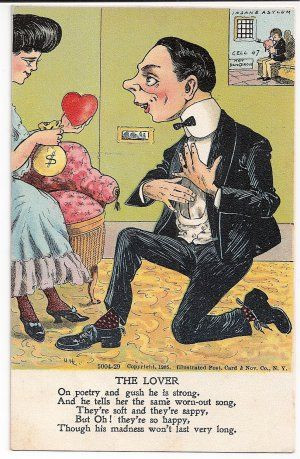Savage Victorian Valentine's: 350 Insulting Cards Unearthed!
Valentine's Day, a celebration of love, but what if the love letters were hate mail? A fascinating glimpse into the past reveals a shocking tradition: the 'Vinegar Valentine'. These weren't your typical romantic missives; they were acidic, anonymously sent cards designed to mock and humiliate the recipient. Imagine the sting of receiving a cruelly worded message instead of chocolates and flowers! This Valentine's Day, let's delve into the history of these insults, uncovering a hidden chapter in the story of love's most celebrated day.
The Rise of the Penny Post and the Insulting Valentine
The Victorian era saw a massive surge in correspondence thanks to the Penny Post, introduced in 1840. This postal reform revolutionized communication, making it affordable to send a far greater volume of letters. In 1840 alone, the number of letters sent more than doubled. In the following ten years, it doubled again! This affordability and ease of communication wasn't only used for expressions of affection; it also opened up a new avenue for anonymous insults. The cards, often unsold stock from stationery shops like William Low’s in Wimborne High Street (open between 1837 and 1871), became popular from the 1840s onwards, allowing the sender to anonymously express their animosity.
The Museum of East Dorset now houses an astonishing collection of 350 of these 'Vinegar Valentines'. The curator, Rob Gray, describes the collection as “Character assassination may be rife online nowadays but looking at these Vinegar Valentines, Victorians certainly also knew how to hit where it hurt.” These weren't just playful jabs; they were calculated attacks meant to inflict emotional pain. The cards were sometimes used to discourage the attention of would-be suitors through mockery and contempt. The museum’s display of these hundreds of cards, alongside more traditional Valentine's Day cards, is open all year round.
A Near Miss for History
This remarkable collection wasn't always destined for preservation. It was discovered by an ironmonger in 1904, after the old shop unit was boarded up by a previous occupier in 1872. Astonishingly, these poignant pieces of history were almost destroyed during World War Two as part of a paper recycling effort. Fortunately, someone intervened, and this unique collection was successfully saved, giving us a rare glimpse into Victorian social dynamics.
The Content of the Cards
The cards themselves are a fascinating study in social commentary. They weren't subtle; they were brutal, targeting personal flaws and insecurities. The messages, often rhyming couplets, delivered stinging critiques of the recipient's appearance, personality, or social standing. Imagine the shame of receiving a card openly mocking your looks or character—a truly public humiliation! Such cards – such as this one – were sent to mock or humiliate their recipient. The museum's collection provides a startling window into the Victorian era's darker side of communication, showcasing the intensity of social pressures and the lengths people went to in expressing animosity.
A Legacy of Insulting Valentines
While the practice of sending 'Vinegar Valentines' is thankfully a relic of the past, their existence highlights a timeless aspect of human interaction: the capacity for both great kindness and intense cruelty. These cards serve as a reminder that even on a day devoted to love, the darker sides of human nature could find an outlet. The survival of this collection, almost lost to history, allows us to reflect on the evolution of communication and social norms. The cards' enduring power lies in their ability to shock and fascinate, prompting us to consider the evolution of both communication and social norms over time.
A Lasting Legacy: Preserving History's Harsh Truths
The Museum of East Dorset's collection of Vinegar Valentines stands as a testament to the enduring power of history. More than just a quirky artifact, the cards offer a complex, often uncomfortable reflection on the past. It challenges our assumptions about romantic holidays, unveiling a side often obscured by rose-tinted glasses. The cards are not simply amusing relics; they are potent historical documents, revealing aspects of Victorian social dynamics, the power of anonymity, and the evolution of communication technologies. This Valentine's Day, remember the bitter side of love's history. By understanding this legacy, we can better appreciate the complexities of human relationships and the ways in which love, hate, and humor intersect throughout time. The ongoing display at the Museum of East Dorset ensures the stories of these insulting missives are not forgotten. It is a reminder of the fascinating – and sometimes brutal – history of Valentine’s Day. The preservation of these cards serves as a potent reminder of the importance of historical preservation and the invaluable insights we gain from examining the past.

















